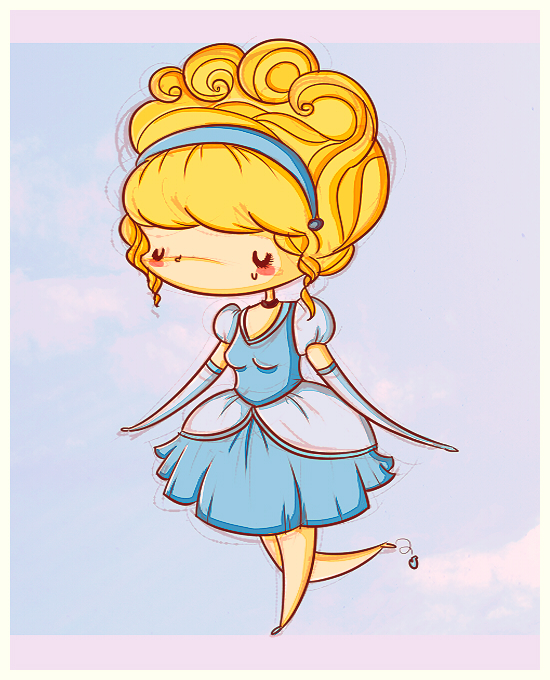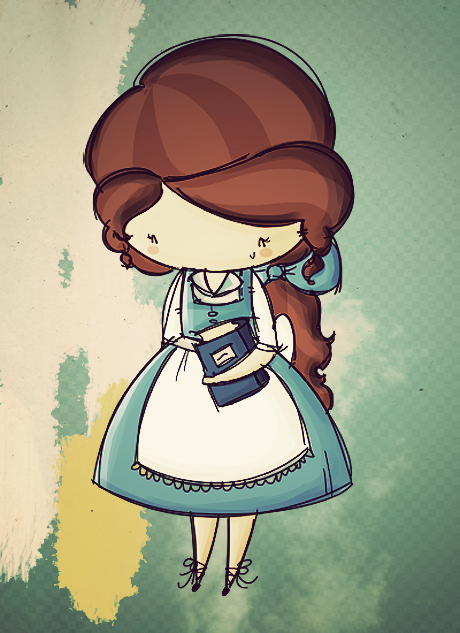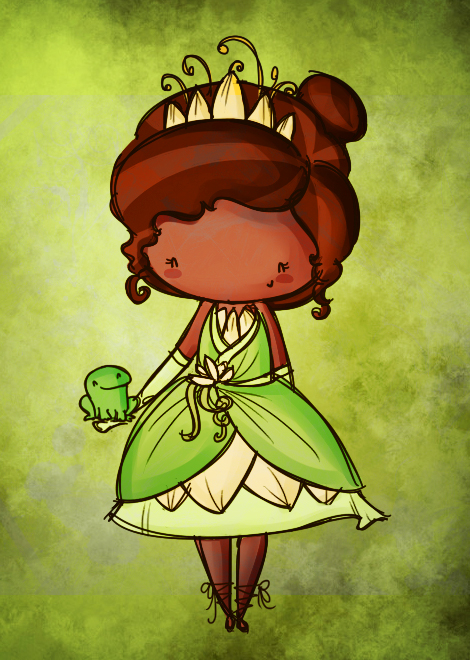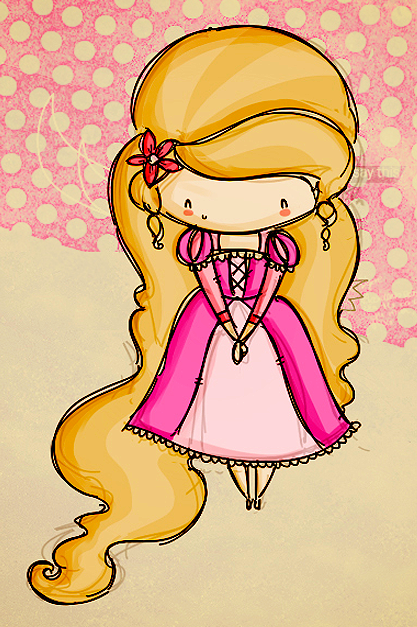We can't deny that the older Disney princesses were anything but role models to the young women of today. Snow White's constant refrain of "Someday my prince will come" was nothing if not personified in the princesses who followed immediately after, Aurora and Cinderella. All three of these ladies exemplify the old-fashioned stereotype of women as the helpless, hapless victims of circumstance, of a fate enacted upon them by an evil older woman of great power and even greater corruption (sometimes the only other woman we meet in the movie), who need men to sweep in and rescue them from their trials and whisk them away to Happily-Ever-After-Land.
The reason why these movies have come under scorn, in the past few decades especially, should be fairly obvious. Wave after wave of feminism has been paving the way for women to move beyond those conventional stereotypes, to embrace their power over their own destinies, and, most importantly, to teach them that their power to do both of those things is not based on the affections or attentions of a man.
Thankfully, though, the next wave of movies rolled in with sweeping changes in characters and themes, all of which were much more fitting to the mindsets of the eighties and nineties. Ariel, Belle, and Jasmine were independent, confident young women who stood precariously with one foot on the solid ground imposed by their patriarchal societies and one foot dangling dreamily into their own hopes for the future. Ariel wants desperately to join the utopia she perceives life on land to be, a flame which is fanned by her attraction to the human Prince Eric. Belle would happily reject society altogether in favor of fairy tales until she sacrifices her quiet life for a stay in the Beast's castle, where if nothing else she can escape the pressures put upon her by her pastoral French village. Jasmine is the impetuous princess of Agrabah who refuses to become some entitled sultan's trophy wife and demands instead that she marry for love. I think it's pretty obvious why these princesses are by far the most dearly-loved by my generation: they have the same values of curiosity, loyalty, and honesty that so many of us have grown up with, even if their stories do hinge greatly on "getting the guy." However, they've also got huge character flaws- Ariel leaves behind her home, her family, and everyone she loves for a guy, and Belle is nothing if not a textbook example of Stockholm Syndrome. Even Jasmine, it could be said, sacrifices her deeply-rooted desire for honesty by taking back the guy who lied to her over and over again about his very identity. I mean, sure, he saved her life, so that helps, but still, it's not a move I'd respect very much in a real person.
These characters also mark a huge shift in the heroines with which we are provided as young people. While these characters certainly still have their problems, and the romantic lessons one gleans from these stories aren't the best (ie: they can lie to you, verbally abuse you, and take you away from your family forever, as long as it's in the name of love), but as far as their predecessors go, they're an absolute grand jeté in the right direction. They tell young people that it's okay for you to want something more than you're given by circumstance, and to strive for the type of future you truly feel you deserve, no matter what the people around you expect. Thinking of my friends who identified most with these princesses in our youth, they're all strong, independent people making their way in the world, no matter what their friends or families think of them for it. I'm not saying that these Disney movies caused this mindset, but they certainly could have contributed to it.
A third, more recently-concluded wave of princesses featuring Pocahontas, Mulan, and Tiana follow in the footsteps of those who came directly before them. They have the same struggles of personal independence against the rigid societies they've been born into and the same romantic, masculine-driven undertones to their stories (ie, they owe a huge change in their fortunes to the men they encounter; without those men, their stories would have been totally different or completely unremarkable). However, there is one key difference to these princesses: they aren't white. Pocahontas is a Native American in what would soon become Virginia, Mulan is a Chinese warrior in the imperial army, and Tiana is an African-American waitress in New Orleans circa the jazz age. Before this, Jasmine was the only non-white Princess in the Disney line-up. And aside from Pocahontas, who, by being the daughter of a chief, is the cultural equivalent of a princess, none of these women have typical royal blood, but all of them have the same strong family ties that their immediate predecessors also possessed.
Each of their movies also deals with unique forms of discrimination as well: Pocahontas chronicles a clashing of two cultures, one of whom defends the rights of their ancestral land, the other of whom pushes for expansion and exploration in the name of their monarch. Mulan shows the struggles of a young woman being oppressed by gender roles and traditions which threaten her family's very wellbeing. And Tiana, of course, is fighting for her dream of owning a grand restaurant on the New Orleans waterfront while dealing with just how little is expected of her as a southern Black woman. They also have strong wills, backed mostly by deeply-rooted ambitions or a sense of justice and honor, and are more than willing to step on some powerful toes to fight for what they know they deserve. This is incredibly poignant when one considers the target market of these princesses: young people of color. While these three women definitely don't accurately represent the demographic of their viewers, having four non-white princesses is certainly a lot better than having none. First Jasmine, and then Tiana, Mulan, and Pocahontas don't solve some the problem of under-representation, but they absolutely do pave the way for even more princesses and heroines of color in popular children's movies.
As Disney Princess movies progress through time, they also become more socially progressive, and the last handful of heroines certainly break the molds set by the originals. However, even the contrast between the two most recent princesses, Merida and Rapunzel, shows an interesting shift in mindsets. Both are princesses by birth, though Rapunzel doesn't know it, both have rather remarkable hair, and both are white. However, Rapunzel's world is literally confined to her tower and visits from her mother (not counting, of course, her charming chameleon sidekick, Pascal), and the only "society" she bucks against is the upbringing her guardian imparts to her, in which fear and uncertainty are instilled in a headstrong and ambitious young woman with only varying degrees of success. Merida is actively rebelling against what one may assume is centuries of tradition, not to mention the expectations of her own parents, by refusing one of the most important rites in a young princess's life. Now, the biggest uniting factor between these two princesses is their fierce desires to take control of their own destinies: Rapunzel's one dream is to see the lights which float in the sky every year on the evening of her birth, and Merida's desire to discover who she is as a person and where that person can fit into the traditions of her home speeds her on a journey through magic and mythology. It's unfortunate that Rapunzel would probably never have had the confidence or means to actually achieve her goal if the charming renegade Flynn Rider had never stumbled upon her tower and whisked her away; however, the voyage is very much about the two of them working together so that she can achieve her life's goal. It's refreshing to see a story about a driven young woman being supported by her romantic interest so whole-heartedly, no matter what other forces come into play throughout the story. And, honestly, as far as Merida goes, I have so many things to say about this wonderful Princess that she really needs her own article - it's in the works, though, so keep an eye out for it!
These two young women are the type of heroines I would be delighted to show my own future children because they have a very definite moral: whoever you are is an excellent person to be, no matter who tries to hold you down or change you, and having goals to work towards make that person an even more spectacular one, as long as you don't let your dreams control your life and keep you from smelling the roses. This moral is much, much healthier than anything gleaned from the movies which came before it (excepting maybe the third wave's sweeping themes of diversity and acceptance), and is one that I would be happy to impart to any youth of any age or era.
In the end, after all, it's important to remember that that's what all movies and media are, especially those meant for children: a way to communicate ideas to an impressionable audience, and some of those ideas - the importance of family; the necessity of being true to oneself; the audacity of believing in yourself, even if you're the only one who does - would benefit any of us to be reminded of. However, it's important to take those wonderful themes with a grain of salt and be conscious of what else is being communicated in these movies - especially when all of these life lessons are being imparted to children who don't have enough experience of their own to act as a foil against those harmful ideas that they're seeing. It's especially easy for lolitas to appreciate the sweet romances, the awe and respect of magic, and the childlike simplicity of these movies; however, when we consider the impact they can have on society and those more impressionable than ourselves, it can be easy for us to understand the intense scorn with which many adults regard them. There's nothing wrong with enjoying Disney Princess flicks- as long as we remember that, no matter what we may get out of them, sometimes there's more to it than what we're perceiving, and those other messages really shouldn't be looked past because of our appreciation of the fairytale fantasies portrayed therein.
A third, more recently-concluded wave of princesses featuring Pocahontas, Mulan, and Tiana follow in the footsteps of those who came directly before them. They have the same struggles of personal independence against the rigid societies they've been born into and the same romantic, masculine-driven undertones to their stories (ie, they owe a huge change in their fortunes to the men they encounter; without those men, their stories would have been totally different or completely unremarkable). However, there is one key difference to these princesses: they aren't white. Pocahontas is a Native American in what would soon become Virginia, Mulan is a Chinese warrior in the imperial army, and Tiana is an African-American waitress in New Orleans circa the jazz age. Before this, Jasmine was the only non-white Princess in the Disney line-up. And aside from Pocahontas, who, by being the daughter of a chief, is the cultural equivalent of a princess, none of these women have typical royal blood, but all of them have the same strong family ties that their immediate predecessors also possessed.
Each of their movies also deals with unique forms of discrimination as well: Pocahontas chronicles a clashing of two cultures, one of whom defends the rights of their ancestral land, the other of whom pushes for expansion and exploration in the name of their monarch. Mulan shows the struggles of a young woman being oppressed by gender roles and traditions which threaten her family's very wellbeing. And Tiana, of course, is fighting for her dream of owning a grand restaurant on the New Orleans waterfront while dealing with just how little is expected of her as a southern Black woman. They also have strong wills, backed mostly by deeply-rooted ambitions or a sense of justice and honor, and are more than willing to step on some powerful toes to fight for what they know they deserve. This is incredibly poignant when one considers the target market of these princesses: young people of color. While these three women definitely don't accurately represent the demographic of their viewers, having four non-white princesses is certainly a lot better than having none. First Jasmine, and then Tiana, Mulan, and Pocahontas don't solve some the problem of under-representation, but they absolutely do pave the way for even more princesses and heroines of color in popular children's movies.
Warning: Brave discussed ahead! I'm trying to keep spoilers out of it, but proceed only with caution if you haven't seen it!
As Disney Princess movies progress through time, they also become more socially progressive, and the last handful of heroines certainly break the molds set by the originals. However, even the contrast between the two most recent princesses, Merida and Rapunzel, shows an interesting shift in mindsets. Both are princesses by birth, though Rapunzel doesn't know it, both have rather remarkable hair, and both are white. However, Rapunzel's world is literally confined to her tower and visits from her mother (not counting, of course, her charming chameleon sidekick, Pascal), and the only "society" she bucks against is the upbringing her guardian imparts to her, in which fear and uncertainty are instilled in a headstrong and ambitious young woman with only varying degrees of success. Merida is actively rebelling against what one may assume is centuries of tradition, not to mention the expectations of her own parents, by refusing one of the most important rites in a young princess's life. Now, the biggest uniting factor between these two princesses is their fierce desires to take control of their own destinies: Rapunzel's one dream is to see the lights which float in the sky every year on the evening of her birth, and Merida's desire to discover who she is as a person and where that person can fit into the traditions of her home speeds her on a journey through magic and mythology. It's unfortunate that Rapunzel would probably never have had the confidence or means to actually achieve her goal if the charming renegade Flynn Rider had never stumbled upon her tower and whisked her away; however, the voyage is very much about the two of them working together so that she can achieve her life's goal. It's refreshing to see a story about a driven young woman being supported by her romantic interest so whole-heartedly, no matter what other forces come into play throughout the story. And, honestly, as far as Merida goes, I have so many things to say about this wonderful Princess that she really needs her own article - it's in the works, though, so keep an eye out for it!
These two young women are the type of heroines I would be delighted to show my own future children because they have a very definite moral: whoever you are is an excellent person to be, no matter who tries to hold you down or change you, and having goals to work towards make that person an even more spectacular one, as long as you don't let your dreams control your life and keep you from smelling the roses. This moral is much, much healthier than anything gleaned from the movies which came before it (excepting maybe the third wave's sweeping themes of diversity and acceptance), and is one that I would be happy to impart to any youth of any age or era.
In the end, after all, it's important to remember that that's what all movies and media are, especially those meant for children: a way to communicate ideas to an impressionable audience, and some of those ideas - the importance of family; the necessity of being true to oneself; the audacity of believing in yourself, even if you're the only one who does - would benefit any of us to be reminded of. However, it's important to take those wonderful themes with a grain of salt and be conscious of what else is being communicated in these movies - especially when all of these life lessons are being imparted to children who don't have enough experience of their own to act as a foil against those harmful ideas that they're seeing. It's especially easy for lolitas to appreciate the sweet romances, the awe and respect of magic, and the childlike simplicity of these movies; however, when we consider the impact they can have on society and those more impressionable than ourselves, it can be easy for us to understand the intense scorn with which many adults regard them. There's nothing wrong with enjoying Disney Princess flicks- as long as we remember that, no matter what we may get out of them, sometimes there's more to it than what we're perceiving, and those other messages really shouldn't be looked past because of our appreciation of the fairytale fantasies portrayed therein.
All art in this post from ~agusmp on devianart, posted with permission!





No comments:
Post a Comment